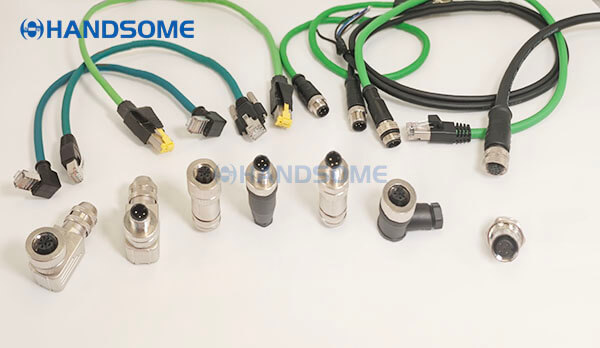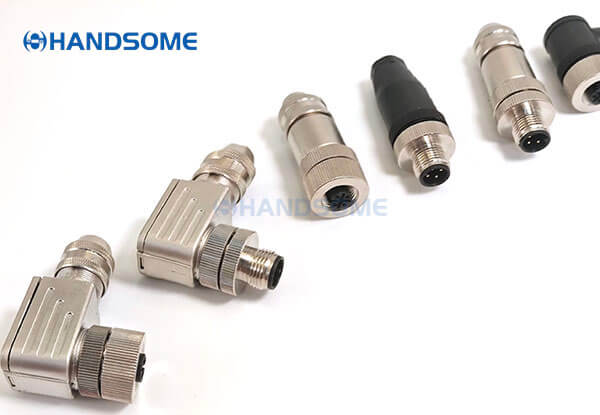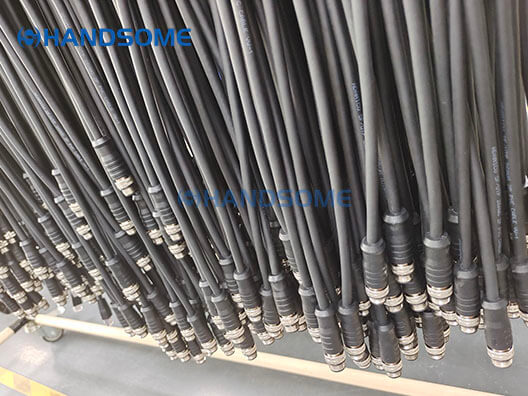Table of Contents
In the realm of industrial Ethernet connections, there exists a specialized class of connectors known as the M Series. This family of connectors, including M5, M8, M9, M12, M16, M23, M40, and 7/8, plays a crucial role in various industrial applications. Despite being less prominent than standard network cables, these connectors offer unique advantages tailored for industrial environments. This guide provides an in-depth look at each type of M Series connector, highlighting their features, benefits, and applications.

M Series Connector Classification
M Series connectors are categorized based on their structure, purpose, and electrical characteristics. Each type serves distinct functions in industrial settings. Here’s a detailed overview:
M5 Connector
Overview: The M5 connector is compact and widely used for sensors and automation technology.
- Protection Level: IP67, suitable for harsh environments.
- Rated Current/Voltage: Up to 1A / 60V.
- Contact Material: Gold-plated brass.
- Cable Types: PUR and PVC, with temperature ranges from -10°C to +80°C or -40°C to +105°C.
- Shielding: Optional.
- Data Transmission Rate: Up to 10 Gbps.
- Power Rating: Up to 16A / 690V.
- Applications: Automation technology, sensors, actuators, and signal transmission.
M8 Connector
Overview: The M8 connector is smaller than the M12, making it ideal for compact applications.
- Protection Level: IP67.
- Rated Current/Voltage: Supports 100 Mbps and Type 1 POE; 8-pin versions support up to 10 Gbps and higher POE.
- Thread Specification: M8 × 1.0.
- Applications: Small sensor equipment and space-constrained applications.
M9 Connector
Overview: The M9 connector is versatile and used in various industrial wiring systems.
- Protection Level: IP67 or IP68.
- Applications: Photoelectric switches, sensors, and other industrial connections.
- Special Features: Self-locking mechanism, customizable designs, suitable for high-vibration environments.
M12 Connector
Overview: The M12 connector is widely used in industrial environments with multiple encoding options.
- Encoding Types:
- A Code: Sensor connections, DC power, 1G Ethernet.
- B Code: Profibus communication.
- C Code: AC Power.
- D Code: 100M Ethernet.
- X Code: 10G Ethernet.
- S Code: AC Power (new standard for C encoding).
- T Code: DC Power (new standard for A encoding).
- Applications: Sensors, Ethernet, Profibus, and various industrial communications.
M16 Connector
Overview: The M16 connector is robust and designed for high-speed data and signal transmission.
- Protection Level: IP66 and IP68.
- Rated Current/Voltage: Up to 10 Gbps.
- Applications: Aerospace, aviation, and industrial machinery.
- Special Features: Push-Lock direct-insertion, vibration resistance.
M23 Connector
Overview: Versatile and durable, the M23 connector is used for high-current and high-voltage applications.
- Protection Level: IP67.
- Rated Current/Voltage: Up to 28A / 630V.
- Applications: Industrial automation, medical, maritime, automotive.
- Special Features: Shielded versions available, quick connection systems.
M40 Connector
Overview: The M40 connector is designed for high current and high voltage transmission in demanding environments.
- Protection Level: IP66 and IP68.
- Rated Current/Voltage: Up to 63A / 630V.
- Applications: Robots, sensors, engineering machinery.
- Special Features: OneCLICK quick connection technology, high vibration resistance.
7/8 Connector
Overview: The 7/8 connector is a compact solution for various industrial needs.
- Protection Level: IP67.
- Rated Current/Voltage: 13A or 8A at 300V.
- Applications: Automation, mechanical engineering, signal transmission.
- Special Features: Anti-vibration design, multiple core options.
Advantages of M Series Connectors
Despite the dominance of Ethernet cables, M Series connectors offer several advantages:
- Industrial Durability: M Series connectors are designed to endure extreme conditions, including high vibration, oil exposure, and temperature fluctuations.
- High Protection Ratings: Many M Series connectors offer IP67/IP68 ratings, making them suitable for underwater or humid environments.
- Versatility: With a range of core configurations, shielding options, and coding standards, M Series connectors meet diverse industrial needs.
- Compact Size: Many M Series connectors are smaller and more space-efficient than traditional Ethernet connectors.
- High Data Transmission Rates: Some M Series connectors support high-speed data transfer up to 10 Gbps.
- Ease of Installation: Many models feature tool-free connection technologies like push-pull mechanisms.
Applications of M Series Connectors

M Series connectors play crucial roles across various industries:
- Industrial Automation: Connecting sensors, actuators, and control systems for efficient automation.
- Telecommunications: Ethernet connections and data networks.
- Automotive Electronics: Connecting vehicle components for reliable communication and power transmission.
- Consumer Electronics: Integration of devices for audiovisual equipment, computers, and gaming consoles.
- Aerospace and Military: High-reliability connections for critical aerospace and military systems.
- Electricity and Rail Transit: Ensuring stable signal and power transmission for infrastructure.
- Medical Equipment: Connecting medical devices for stable operation and secure data transmission.
- Petroleum Exploration: Adapting to harsh environments for stable electrical connections.
- New Energy and Electric Vehicles: Supporting charging systems for electric vehicles and charging stations.
- Industry 4.0: Meeting the demands of data communication, power distribution, and signal transmission for advanced manufacturing.
Conclusion
The M Series connectors, with their diverse types and advanced features, are essential components in the field of industrial Ethernet and beyond. Their design caters to the rigorous demands of industrial environments, offering high performance, reliability, and versatility. As technology continues to evolve, the M Series connectors will remain integral to innovations in various industries, from automation to aerospace and beyond.
By understanding the distinct features and applications of each M Series connector, users can select the most suitable options for their specific needs, ensuring effective and efficient industrial connectivity.